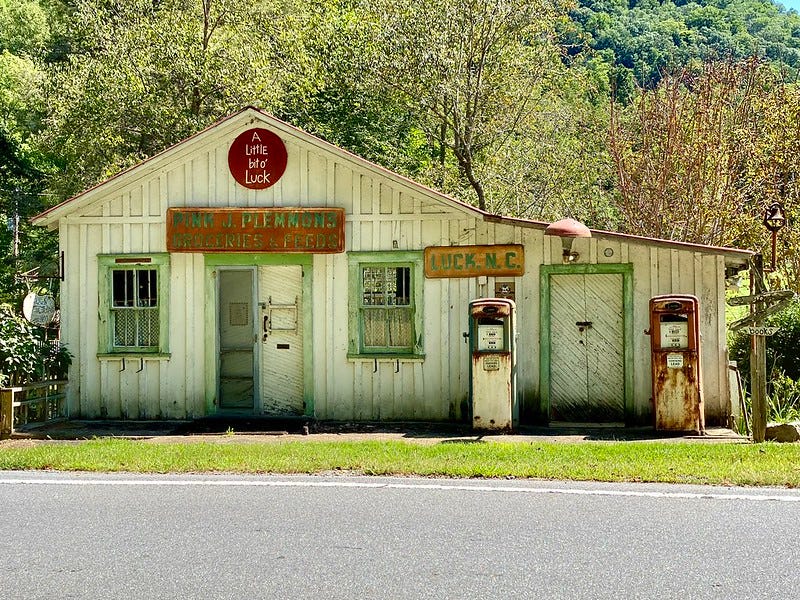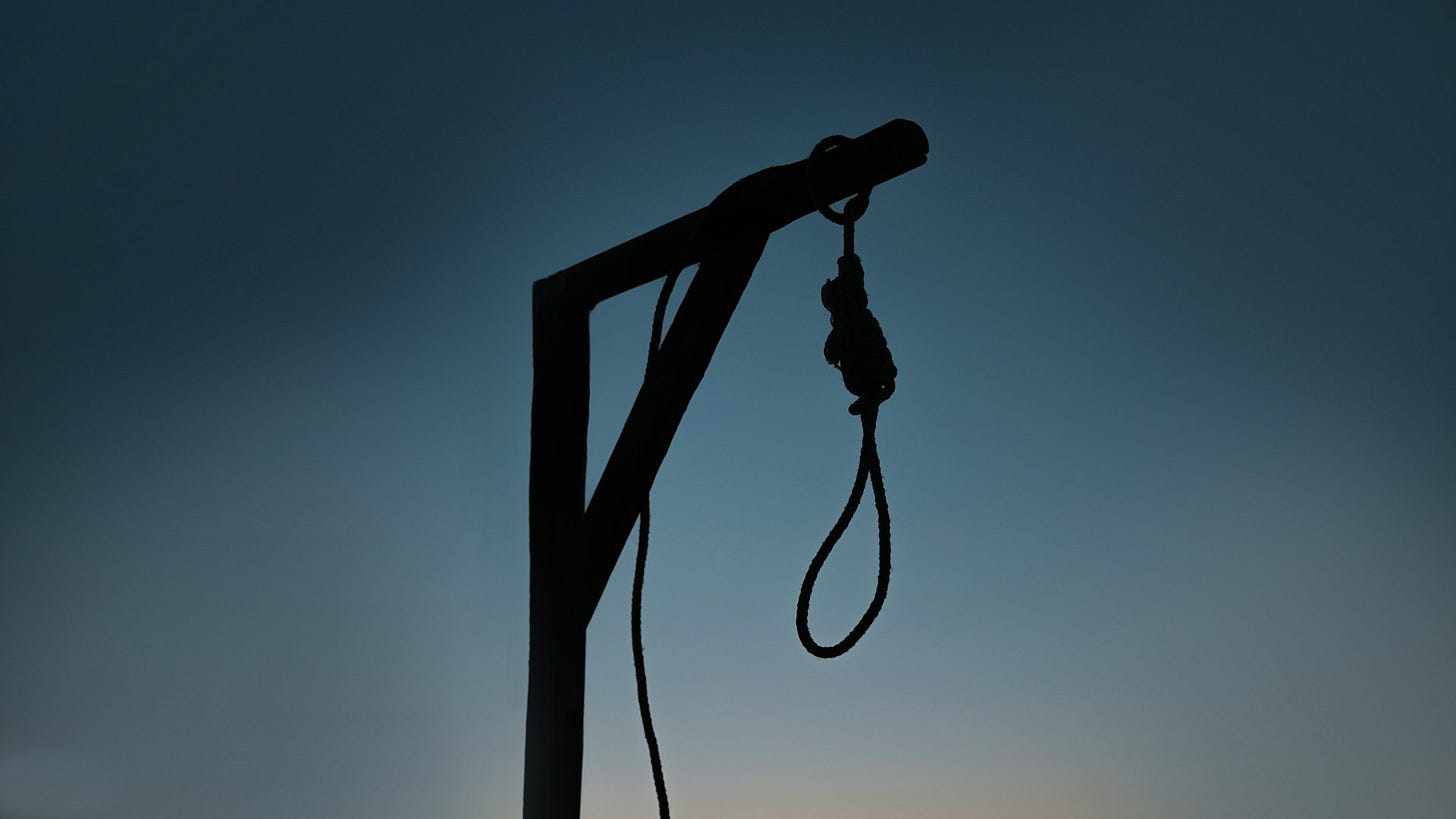Postal Clerk and Cat Thwart Turn of the Century Burglary
A robbery turns into a life-or-death struggle.
It was a rainy Friday night in February 1901 in the village of Emma, NC, three miles west of Asheville. Five men were on a collision course. Three would leave with gunshot wounds. Two would die.
Sometime between 8:00 and 9:00 pm, Samuel Alexander closed D.J. McClelland's store, which also housed the Emma Post Office, for the night.
Alexander had worked there as a store clerk and assistant postmaster for three years. He boarded with the McClelland family and slept in a small room in the rear of the store.
He heard someone at the back door, he went, called through the door, and asked what they wanted. A man answered, saying he wanted to buy coffee and flour. After-hours customers were not unusual.
Alexander opened the door about a foot and saw the barrel of a .44 caliber Smith & Wesson revolver. Two masked men pushed their way into the store: a black man named Ben Foster and a white man named Frank Johnson.
“We have come for business, and you must obey orders,” Johnson said.
They searched Alexander, taking his change purse and a check. They herded him toward his room, and he said:
“You fellows are going to get into trouble.”
“You keep your damned mouth shut,” Johnson replied.
In his room, they found Alexandar’s pistol, which they took.
The men wanted him to unlock the post office desk. Alexander told them that the owner had the key. They were more interested in the store safe anyway.
Alexander said he didn’t know the combination. Johnson drew a knife and threatened to cut his throat. Reluctantly, he opened the safe.
A Cat Intervenes
Johnson put Alexander’s revolver down on top of the safe and stooped down to open a locked partition inside. Foster covered Alexander with his gun.
In the back of the store, a cat jumped down from a shelf to the floor.
Foster turned to see what made the noise, and Alexander saw an opportunity. He reached past Johnson, grabbed the gun off the safe, and shot Foster center mass, the bullet passing just below the heart. Foster staggered back against the counter.
Johnson tackled Alexander and grappled with him for the gun. The revolver broke open, spilling cartridges. Alexander managed to swing the cylinder back into the gun, pressed it into his assailant, and pulled the trigger rapidly.
It clicked repeatedly. The gun was empty.
Foster dragged himself up to the struggling men, pressed his gun against Alexander, and fired. The bullet passed just below his ribs and came out near his spine.
Johnson slashed at him with a knife, and Alexander grabbed the blade, severely cutting his hand. He saw Foster aim the gun at him again, and with all of this remaining strength, he spun Johnson around, putting the man between him and Foster.
Foster fired, hitting Johnson. The bullet struck his left shoulder and ranged upward, lodging in his right jaw.
Both men attacked Alexander, driving him against the counter. Foster placed the big revolver against Alexander’s temple and pulled the trigger three times. Three clicks. Foster then used the gun as a club.
Somehow, Alexander got loose, pulled himself along the counter to the door, and called loudly for help using the Odd Fellows’ signal of distress. He fell and lay in the doorway.
Foster and Johnson decided to make their exit, stepping over his prone form. Before the fleeing bandits reached the foot of the steps, a shot rang out from the darkness, narrowly missing Alexander. He heard multiple men running down the railroad track.
Moments later, the owner, McClelland, and a neighbor, J. F. Ingle, came to his assistance.
The Capture
Foster and Johnson had two accomplices who stood guard outside the store: R. S. Gates and Henry Mills. It’s unclear how the four got back to Asheville, where they were staying in two boarding houses in a disreputable neighborhood near the train depot called “Scratch Ankle.”
They made multiple attempts to hire a hack (a horse-drawn buggy that served as the taxi or Uber of the day) to transport the two wounded men, which drew attention to them. At least two hack drivers found the men suspicious and refused them service.
Having been alerted by a phone call about the robbery, Captain F. M. Jordan and officers Taylor and Collins of the Asheville Police tracked down the men, arrested them, took them to the city jail, and got doctors to treat the two wounded men. The quartet was rounded up before 3:00 am, less than six hours after the crime.
Alexander’s abdominal wound was severe, and for several days, it was uncertain if he would survive. He was supposed to wed Laura Penland the following week, but at her insistence, they were married in the store on Sunday.
Lynching Fears
It was feared that if Alexander died, the men might be lynched. Foster and Mills were black, so there may have been a racial component to the desire to storm the jail and punish the Emma robbers.
Additionally, it came to light that the men appeared to be behind a string of recent street robberies.
The lynching rumors became so intense and so general that the men were moved to the county jail, and Sheriff R. F. Lee telegraphed Governor Charles B. Aycock, who placed two military companies at Lee’s disposal: the Blue Ridge Rifles and the Asheville Light Infantry. The units took turns guarding the jail.
Alexander, through his father, contacted the Asheville Daily Citizen, asking that the public refrain from violence, saying “it is his wish that the law take its course in respect to the robbers.”
Once it became clear that Alexander would not be strong enough to testify until the next term of court, Foster, Johnson, Gates, and Mills were quietly shipped to the Mecklenburg County jail for safekeeping.
On March 26, while in custody at the Mecklenburg County jail, Ben Foster attacked another inmate, Giles Gaffney, with a chair leg, fracturing his skull. Early reports said Gaffney was not expected to survive. A later news item stated that his condition was improving.
A Standing Room Only Trial
With Alexander finally well enough to testify, on Friday, June 7, the trial for the Emma burglars drew an immense crowd of spectators. The public's intense interest in the case only grew during the four-day trial.
The evidence against them was overwhelming: eyewitness testimony, their wounds, and the items found in their possession at the time of arrest: revolvers, knives, and skeleton keys.
There was a great deal of back and forth between the defense attorneys and the prosecution about whether the men had robbed a store or a dwelling house. This is the difference between first-degree burglary, which carried a death sentence, and second-degree burglary, which generally resulted in imprisonment for 10 years to life.
On June 11, all four men were found guilty of burglary in the first degree. The Raleigh News and Observer headline read:
“The Four Must Die”
You’ll recall that when Foster and Johnson walked Alexander to his room, he said, “You fellows are going to get into trouble.” If they had not entered his sleeping quarters, they would have had a much stronger argument for second-degree burglary. Crossing that threshold put their feet on the platform of the gallows.
The case was automatically appealed to the North Carolina Supreme Court, which affirmed the lower court’s decision on December 23.
On Friday, February 21, 1902, Governor Aycock commuted the sentences of Gates and Mills to life imprisonment. He reasoned that the two men did not enter the store, and they did not abandon the two wounded men, which would have made their escape much easier.
A Scaffold Built for Two
Public hangings were not allowed in North Carolina, still a crowd of several thousand assembled around the jail hours before the execution.
A scaffold and shed enclosure were constructed and placed at the northeast corner of the jail. Sheriff Lee drew lots to determine the 36-member jury that would be allowed to view the hanging. One juror’s name stood out: D.J. McClelland of Emma.
When performed correctly, hanging is intended to be a quick and relatively painless execution. The rope length must be precisely calculated: if too short, the noose slowly strangles the condemned; if too long, the force may decapitate them.
To ensure a swift death, the drop distance was carefully determined based on the person’s height and weight. The knot’s placement also played a crucial role in facilitating a clean fracture of the cervical spine.
J. M. Monroe, the former sheriff of Rowan County, was brought in to assist with the hanging due to his experience. He calculated the drops for each prisoner. As you will see, we can give Monroe at best partial credit.
After the prisoners and ministers concluded their remarks, black hoods were placed over the prisoners' heads, the nooses were adjusted, their hands were bound behind their backs, and their legs were bound below their knees. The platform was cleared.
Sheriff Lee pulled the lever, and the entire platform fell away with a thud. Both men dropped to the end of their ropes.
Johnson was almost instantly motionless except for a brief quivering caused by reflex action: a clean break.
Foster writhed, and the rope swung back and forth for at least two minutes.
The attending physicians found Johnson's pulse beating intermittently for six minutes and Foster's for 10 minutes. After 18 minutes, Johnson was cut down, and after 24 minutes, Foster was also declared dead.
Johnson's neck had been broken. There was a partial dislocation of Foster's neck, due, the doctors agreed, to the contraction of the muscles. He died of strangulation.
Both men were placed in coffins and taken away.
Authors Notes:
I was not able to discover what exactly the Odd Fellows’ signal of distress was. If you know, email me. The Independent Order of Odd Fellows (IOOF) was a non-political international fraternal order. Around 1900, the Odd Fellows became the largest fraternal organization, even larger than Freemasonry. The organization faded away over time. The Great Depression and Franklin D. Roosevelt's New Deal accelerated its decline.
McClelland or McLelland? Newspaper accounts refer to the store owner and postmaster as both D. J. McClelland and D. J. McLelland. The North Carolina Supreme Court decision upholding the conviction of the four assailants refers to him as D. J. McClelland.
Sources
STATE v. FOSTER, Supreme Court of North Carolina, December 23, 1901
Arthur, John Preston. Western North Carolina: A History from 1730 to 1913. Asheville, NC, Edward Buncombe Chapter of the Daughters of the American Revolution, 1914, pp. 307–308.
Asheville Gazette, Saturday, February 9, 1901, Page 5, “Desperate Robbery by Masked Men”
Asheville Citizen, Monday, February 11, 1901, Page 1, “Young Alexander Takes His Bride”
Asheville Semi-Weekly Citizen, Friday, February 15, 1901, Page 3, “Military Companies Called Out and Many Deputies Summoned by Sheriff”
Charlotte Observer, Wednesday, March 27, 1901, Page 5, “Dangerous Fight in Jail”
Asheville Daily Gazette, Saturday, June 8, 1901, Page 5, “Alexander Describes Celebrated Burglary”
Asheville Semi-Weekly Citizen, Tuesday, June 11, 1901, Page 1, “Alexander’s Remarkable Story Told”
Raleigh News and Observer, Thursday, June 13, 1901, Page 6, “The Four Must Die”
Asheville Citizen, Saturday, February 22, 1902, page 1, “Governor Commutes Sentence of Two of the Emma Burglars”
Asheville Daily Gazette, Thursday, February 27, 1902, Page 1, “Two of the Emma Burglars Die Together on the Gallows”








My latest article: Three men fight for survival in a quiet NC country store.